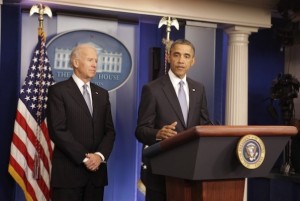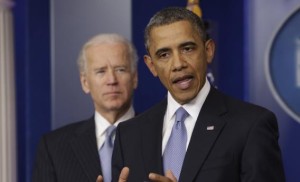What Happens After the Fiscal Cliff?
 As the fiscal cliff looms, efforts are being made to avert the cliff, but little progress is being made. Some lawmakers are predicting that increases in federal income taxes and federal spending cuts will begin to take hold this coming January, unless there are strides made to complete the deal.
As the fiscal cliff looms, efforts are being made to avert the cliff, but little progress is being made. Some lawmakers are predicting that increases in federal income taxes and federal spending cuts will begin to take hold this coming January, unless there are strides made to complete the deal.
With the possibility of such changes happening, the economy stands to be hit by a great jolt. In some predictions economists predict that another recession could be veryconceivable. If the nation were to fall over the so called “cliff”, consumer spending power will greatly decrease and the federal government will see an annual tax increase of about 500 billion dollars. While this will cut the federal budget deficit by a considerable amount, it will be at a great economic price.
According to the Tax Policy Center, on average the federal income tax bill will increase by $3,500. And the average middle income home will see an increase of about $2,000.
If the fiscal cliff actually becomes a reality, federal income taxes will be greatly affected. On December 31, the low ordinary federal income tax, put in place by former president George W. Bush, will expire. An extension by President Obama and Congress was agreed upon in the end of 2010, but this extension will only have a few days remaining. Along with this lapse in the low ordinary federal income tax, Americans will see rates increase up to 15, 28, 31, 36, and 39.6% from the current 10, 15, 25, 28, 33, and 35%.
There is an effort being made by President Obama and his fellow Democrats to extend the Bush era tax rates, but this would only be for those who make less than $200,000 or for a family making less than $250,000. For the rest of those who don’t fall into this category federal income tax rates would increase to the higher pre-Bush era.
Categories: Federal Tax, Income Tax, Tax Law Tags: federal income tax, federal tax, income tax, payroll tax, tax code, tax law, tax reform
Speaker of the House proposes tax hike for millionaires
 In a recent proposition made by the Speaker of the House, John Boehner, an increase in federal income tax for the wealthiest Americans could be made, but only in exchange for an agreement by President Obama to make a major cut to entitlements.
In a recent proposition made by the Speaker of the House, John Boehner, an increase in federal income tax for the wealthiest Americans could be made, but only in exchange for an agreement by President Obama to make a major cut to entitlements.
This proposition would mark the first time that Speaker Boehner has offered a rise in marginal federal income tax rates since the talks regarding the fiscal cliff have begun. The offer proposed suggested a hike in Bush-era federal income tax rates for those who have an annual income of one million dollars or more.
As a part of the proposition Speaker Boehner also is looking to implement a new method, “Chained CPI”, for calculating the benefits of entitlement programs. By using this method the growth of federal health programs, such as Medicare, would slow down, saving billions of dollars over the next ten years.
Although the proposition did make strides in terms of federal income tax increases, there was nothing included to extend the federal unemployment benefits and no mention was made about how sequestration would be addressed.
A deal is not close to be made, but a phone conversation, after a recent face to face session, between President Obama and Speaker Boehner suggested that both parties are making progress in their negotiations.
The offer on federal income tax by Speaker Boehner was a significant move towards the position held by President Obama. Unfortunately the overall proposal still is unacceptable to the Democrats considering the level of revenue, the hit beneficiaries would take from the changes to entitlement programs, and the lack of extension to the federal unemployment benefits.
Categories: Federal Tax, Income Tax, Tax Law Tags: buffet rule, federal income tax, federal tax, fiscal cliff, fiscall cliff, take hike, tax code, tax cuts, tax law, tax pledge, tax reform, tax the rich
Obama : Congress should make “fiscal cliff” deal
 In an attempt to avoid the quickly approaching fiscal cliff at year’s end, President Obama curbed his legislative aspirations, and implored Congress to take stopgap measures in order to continue benefits to unemployed workers and prevent a rise in federal income taxes for those individuals making less than $250,000 per year.
In an attempt to avoid the quickly approaching fiscal cliff at year’s end, President Obama curbed his legislative aspirations, and implored Congress to take stopgap measures in order to continue benefits to unemployed workers and prevent a rise in federal income taxes for those individuals making less than $250,000 per year.
By implementing the plan, groundwork should be laid for actions in the upcoming year to encourage economic growth and bring the national debt under control, according to President Obama at a White House news conference. Unfortunately with federal income taxes set to increase for every American in a matter of days, President Obama admitted that time is just too limited to put into place far-reaching legislation.
Only a day previous to this statement, House Republicans declined an alternative federal income tax advanced by Speaker of the House John Boehner which would have prevented any increase to federal income taxes for those making less than one million dollars a year. It was shot down by conservative who hesitated at the prospect that federal income taxes would rise for approximately 400,00 households.
If a bill were to pass with a threshold of $250,000, federal income taxes would go up for about 3 million American families. Although a compromise between President Obama and Speaker Boehner is most critical for moving talks forward, Senate Democrats said theywould be willing to take on a bigger role in the talks.
Democrats also said they would seek to postpone the spending cuts which would affect the federal agency budgets in the coming month. Both the Democrats and Republicans also want to avoid the alternative minimum federal income tax which would affect millions of new taxpayers this April.
Categories: Federal Tax, Income Tax, Tax Law Tags: federal income tax, federal tax, fiscal cliff, income tax

